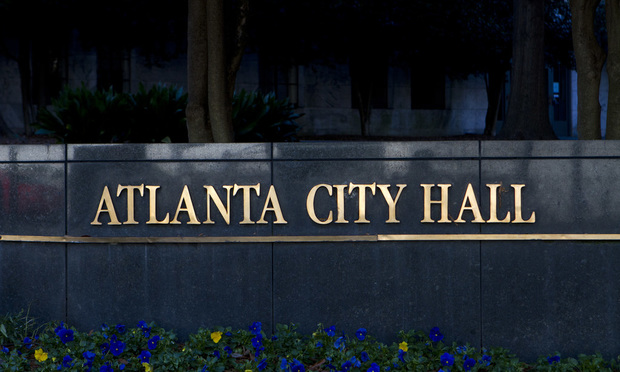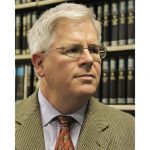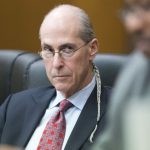Were Paul Hastings' Flat-Fee Bills to City of Atlanta Just Vague or Something Worse?
Criminal defense lawyers weigh in on the ongoing federal probe of former Mayor Kasim Reed's administration that has now reached his former firm, Paul Hastings.
May 28, 2019 at 02:56 PM
11 minute read
 Atlanta City Hall. Photo by John Disney/ALM
Atlanta City Hall. Photo by John Disney/ALM
Why would Paul Hastings pay $90,000 to Atlanta's former city attorney after the law firm earned millions representing the city and its airport under her watch?
That's a key question for federal prosecutors in the ever-widening, almost four-year corruption probe into former Mayor Kasim Reed's administration. The probe expanded earlier this year to the city's dealings with Paul Hastings and Reed's ex-city attorney, Cathy Hampton, the Atlanta Journal-Constitution has reported.
Paul Hastings' $90,000 in payments to Hampton, on top of its prior $2.2 million in flat-fee bills to the city, raised concerns for ethics and billing experts as well as several criminal defense attorneys. While highly unusual, they told the Daily Report, the law firm's vague bills to the city, specifying neither timekeepers nor their activities, and its subsequent payments to Hampton could signal anything from sloppy documentation to ethics breaches to, at worst, the firm serving as a conduit to fraud.
Paul Hastings could face exposure from the Atlanta U.S. Attorney's Office's ongoing investigation, they added, depending on its findings.
Federal prosecutors have not accused Paul Hastings of any wrongdoing, but they have asked the firm and Hampton for documents pertaining to the Hampton payments and earlier flat-fee bills to the city, according to an AJC report.
Paul Hastings is cooperating with the U.S. Attorney's Office, a firm representative said in a statement in response to the questions about flat-fee billings, including the $90,000 in payments to Hampton, and conflicts of interest first raised by the AJC. “Paul Hastings places the highest priority on ethics and integrity and we expect all our partners and employees to embrace those standards,” the firm said. “We take these allegations very seriously and are reviewing this matter with the support of outside counsel.”
Hampton did not respond to a request for comment.
The AJC reported this month that Paul Hastings paid Hampton's consulting firm $90,000 for “transition services” after she'd stepped down as city attorney. Unbeknownst to the Atlanta City Council, she remained on the city's payroll for another five months.
Hampton's consultancy billed Paul Hastings in two flat-fee, nonitemized invoices. Paul Hastings then billed the city $90,000 for “outside professional services,” with no mention of Hampton's name or role on the invoices.
Paul Hastings reimbursed the $90,000 to the city last September after receiving a demand letter from current City Attorney Nina Hickson, the AJC reported.
City of Atlanta spokesman Michael Smith said in a statement: “This administration has and will continue to fully cooperate with the authorities in order to assist bringing the matter to a swift and fair conclusion.”
 Page Pate/photo by John Disney/Daily Report
Page Pate/photo by John Disney/Daily ReportThe $90,000 transaction between Hampton, Paul Hastings and the city, said criminal defense attorney Page Pate, “if not criminal, was extraordinarily sloppy and potentially unethical,” because of the lack of transparency in the invoices.
“The potential for negative consequences to the firm is much more significant and, perhaps, immediate than the [$2.2 million in] flat-fee billings,” Pate added.
Asked what professional services Hampton may have provided for Paul Hastings, Pate replied, “I assure you, that is precisely what the U.S. Attorney's Office wants to know right now.”
Reed, who started his legal career at Paul Hastings, named Hampton as Atlanta's city attorney when he took office in 2010. She then engaged Paul Hastings as outside counsel for Hartsfield-Jackson Atlanta International airport. Hampton stepped down in May 2017, toward the end of Reed's second term.
Last year, the AJC raised potential underlying conflicts of interest in Paul Hastings' relationships with the city and the airport based on an extensive analysis performed by ethics expert Clark Cunningham, a law professor at Georgia State University. His Sept. 5 and Sept. 14 letters to the AJC are posted on his website.
Cunningham has called for the Atlanta City Council to initiate its own investigation in addition to those underway by the Justice Department and the Federal Aviation Administration.
 Georgia State University College of Law professor Clark Cunningham. Courtesy photo.
Georgia State University College of Law professor Clark Cunningham. Courtesy photo.With respect to the Paul Hastings transaction with Hampton and the city, the council should probe “whether outside counsel for the airport and the City Attorney conspired to steal $90,000 in airport revenue entrusted to the city,” he said in an email. “Atlanta came close this year to losing control of the airport over concerns of pervasive corruption and must now show that its government is committed to real oversight.”
Vague Bills 'Troubling'
Ethics conflicts aside, Pate said, what the Justice Department cares about is “the movement of money and whether there was fraud involved—and whether there was potential bribery or gratuities paid to city officials.”
The criminal defense lawyers who spoke to the Daily Report each emphasized that there is not enough publicly available information to determine whether Paul Hastings' flat-fee invoices to the city for the Hampton payments and for the $2.2 million in earlier legal bills were just vague billing or signs of potential fraud.
“It could be sloppy paperwork, but basically innocent, to something more troubling,” said white-collar defense lawyer Jack Sharman of Lightfoot, Franklin & White in Birmingham.
The distinction between conflicts of interest and actual criminal activity “can get a little blurry,” Sharman added. “Federal prosecutors are not above turning an undisclosed conflict of interest into a federal offense if the facts fit.”
News of Paul Hastings' payments to Hampton followed AJC reports last fall that the city paid the law firm $2.2 million in flat fees from 2014 to 2017 for a series of one-line, nonitemized bills for “litigation consultation” or “legal research,” including several monthly $100,000 payments. That was out of a total $11 million in fees that Paul Hastings had billed to the city since Reed became mayor, at hourly rates of up to $950.
During that time, Paul Hastings was overseeing the city's response to federal grand jury subpoenas over airport concessions and related litigation.
After the AJC's initial report on vague billing was published, federal prosecutors requested an interview with William K. Whitner, Paul Hastings' relationship partner with the city, the paper reported.
The flat-fee billing is “not a smoking gun or red flag. But it is part of the milieu,” said criminal defense attorney Bret Williams, a former federal prosecutor. “In my opinion, the room's getting a little smoky.”
'Knowing Conduit'?
The criminal defense lawyers said the key questions as to potential fraud stemming from Paul Hastings' payments to Hampton are what professional services she performed, whether there is documentation, and whether the law firm disclosed to the city that the $90,000 it billed to be reimbursed was for her services.
 Defense attorney Bruce Harvey. Photo by Alyssa Pointer/[email protected].
Defense attorney Bruce Harvey. Photo by Alyssa Pointer/[email protected].Atlanta solo Bruce Harvey said any potential civil or criminal liability for Paul Hastings depends on “the backup documentation and whether the city was aware of it.”
Especially since the city is a public entity, Harvey added, he'd expect the billing to be transparent, “as opposed to shrouded in secrecy.”
The Hampton payments may suggest some kind of kickback, or they could be innocuous, Williams said. “Perhaps she really did provide legitimate consulting services, and Paul Hastings rightly billed the city for them.”
If the government determines there was any criminal activity, such as a kickback scheme, between Hampton and the Reed administration, Williams said, then was Paul Hastings an “unwitting innocent” used as a middleman or “a knowing conduit in funneling money from the city to Hampton?”
“I would be surprised if a big firm with Paul Hastings' reputation would knowingly step over the line and knowingly join in a conspiracy,” he said, emphasizing that the government has not charged anyone with that.
Hamptons' flat-fee invoices to Paul Hastings “are certainly suspicious,” Pate said, saying that he would expect a big firm to have “much more detailed” invoices, especially for a public entity client. They raise red flags because unitemized bills could signal “an attempt to cover up where the money is actually going,” he said.
But the firm's liability depends on whether its payments to Hampton were unlawful—and, if so, whether any of its lawyers were a knowing participant, Pate added. “If they structured it for her and it turns out to be illegal, then, yes, they can be held responsible.”
The prosecutors will want to know if there was a “scheme to defraud,” Sharman said, that could form the basis for mail or wire fraud charges. He said the more broadly worded “honest services fraud” statute, which addresses bribery and kickbacks, could also come into play.
'Highly Unusual'
Billing transparency is especially important when a law firm's client is a public entity, said law firm billing expert Joe Tiano of Legal Decoder. “It's very surprising,” he said of the probe. “Paul Hastings has an excellent reputation.”
But he called the $2.2 million that Paul Hastings billed the city in one-line invoices for litigation consultation or legal research “highly unusual.”
“I would imagine 99 out of 100 clients would reject those bills and ask for more information about who did what, and how long it took,” said Tiano, who co-founded the legal billing analytics company.
“The era of one-line bills is bygone. With all the billing software programs out there, you're getting very clear, concise narratives,” he said. “The old 'attention to file' or 'for services rendered' doesn't work anymore.”
Large firms such as Paul Hastings typically have a committee that must approve any nonhourly billing, such as rate discounts or flat fees, Tiano said, and clients “have high requirements of transparency.”
In the rare cases when a client might request monthly flat-fee payments for privilege or strategic reasons, Tiano added, they now also ask for “shadow billing,” where the firm separately provides backup information. Anything privileged could be redacted, he said.
But a former federal agent now working for an investigations firm said the city could have instructed the firm not to supply the details of “litigation consultation” in the invoices to maintain attorney-client privilege.
“I have had investigations that cost hundreds of thousands of dollars where we've not delivered one email, because the client didn't want anything in writing. Instead, I delivered a verbal report,” said the former agent, who declined to be named.
He expressed doubt that Paul Hastings would be involved in any kind of kickback scheme. “There are a lot better ways to provide kickbacks than to launder them through a law firm, especially a large firm like Paul Hastings,” he said.
The Atlanta U.S. Attorney's Office's wide-ranging City Hall probe, led by public corruption prosecutor Jeff Davis, has been underway for almost four years. Davis has secured five guilty pleas and another two indictments so far from former city staffers and outside construction contractors.
Pate, who's tried a half-dozen cases against Davis, said the multipronged probe could go a lot longer. The prosecutor “is extremely methodical,” Pate said. “He will wait until one person has cooperated, provided information and pled guilty before focusing on another target.”
“He has a practice of working his way up the ladder—and he does not mind taking his time,” Pate said.
This content has been archived. It is available through our partners, LexisNexis® and Bloomberg Law.
To view this content, please continue to their sites.
Not a Lexis Subscriber?
Subscribe Now
Not a Bloomberg Law Subscriber?
Subscribe Now
NOT FOR REPRINT
© 2025 ALM Global, LLC, All Rights Reserved. Request academic re-use from www.copyright.com. All other uses, submit a request to [email protected]. For more information visit Asset & Logo Licensing.
You Might Like
View All

Alston & Bird, Baker Hostetler, Holland & Knight Promote Partners in Southeast
5 minute read

Trending Stories
- 1Stevens & Lee Names New Delaware Shareholder
- 2U.S. Supreme Court Denies Trump Effort to Halt Sentencing
- 3From CLO to President: Kevin Boon Takes the Helm at Mysten Labs
- 4How Law Schools Fared on California's July 2024 Bar Exam
- 5'Discordant Dots': Why Phila. Zantac Judge Rejected Bid for His Recusal
Who Got The Work
Michael G. Bongiorno, Andrew Scott Dulberg and Elizabeth E. Driscoll from Wilmer Cutler Pickering Hale and Dorr have stepped in to represent Symbotic Inc., an A.I.-enabled technology platform that focuses on increasing supply chain efficiency, and other defendants in a pending shareholder derivative lawsuit. The case, filed Oct. 2 in Massachusetts District Court by the Brown Law Firm on behalf of Stephen Austen, accuses certain officers and directors of misleading investors in regard to Symbotic's potential for margin growth by failing to disclose that the company was not equipped to timely deploy its systems or manage expenses through project delays. The case, assigned to U.S. District Judge Nathaniel M. Gorton, is 1:24-cv-12522, Austen v. Cohen et al.
Who Got The Work
Edmund Polubinski and Marie Killmond of Davis Polk & Wardwell have entered appearances for data platform software development company MongoDB and other defendants in a pending shareholder derivative lawsuit. The action, filed Oct. 7 in New York Southern District Court by the Brown Law Firm, accuses the company's directors and/or officers of falsely expressing confidence in the company’s restructuring of its sales incentive plan and downplaying the severity of decreases in its upfront commitments. The case is 1:24-cv-07594, Roy v. Ittycheria et al.
Who Got The Work
Amy O. Bruchs and Kurt F. Ellison of Michael Best & Friedrich have entered appearances for Epic Systems Corp. in a pending employment discrimination lawsuit. The suit was filed Sept. 7 in Wisconsin Western District Court by Levine Eisberner LLC and Siri & Glimstad on behalf of a project manager who claims that he was wrongfully terminated after applying for a religious exemption to the defendant's COVID-19 vaccine mandate. The case, assigned to U.S. Magistrate Judge Anita Marie Boor, is 3:24-cv-00630, Secker, Nathan v. Epic Systems Corporation.
Who Got The Work
David X. Sullivan, Thomas J. Finn and Gregory A. Hall from McCarter & English have entered appearances for Sunrun Installation Services in a pending civil rights lawsuit. The complaint was filed Sept. 4 in Connecticut District Court by attorney Robert M. Berke on behalf of former employee George Edward Steins, who was arrested and charged with employing an unregistered home improvement salesperson. The complaint alleges that had Sunrun informed the Connecticut Department of Consumer Protection that the plaintiff's employment had ended in 2017 and that he no longer held Sunrun's home improvement contractor license, he would not have been hit with charges, which were dismissed in May 2024. The case, assigned to U.S. District Judge Jeffrey A. Meyer, is 3:24-cv-01423, Steins v. Sunrun, Inc. et al.
Who Got The Work
Greenberg Traurig shareholder Joshua L. Raskin has entered an appearance for boohoo.com UK Ltd. in a pending patent infringement lawsuit. The suit, filed Sept. 3 in Texas Eastern District Court by Rozier Hardt McDonough on behalf of Alto Dynamics, asserts five patents related to an online shopping platform. The case, assigned to U.S. District Judge Rodney Gilstrap, is 2:24-cv-00719, Alto Dynamics, LLC v. boohoo.com UK Limited.
Featured Firms
Law Offices of Gary Martin Hays & Associates, P.C.
(470) 294-1674
Law Offices of Mark E. Salomone
(857) 444-6468
Smith & Hassler
(713) 739-1250






